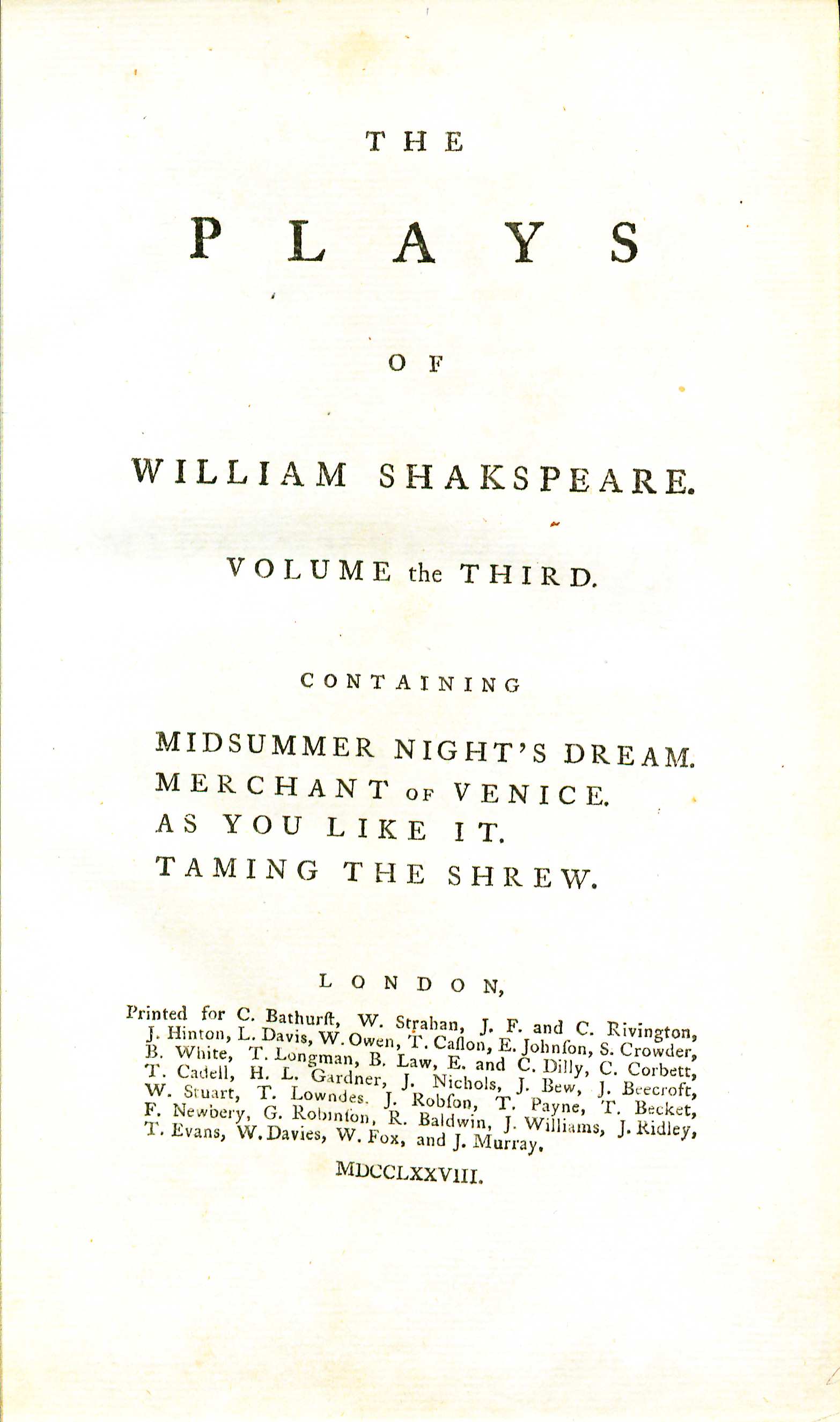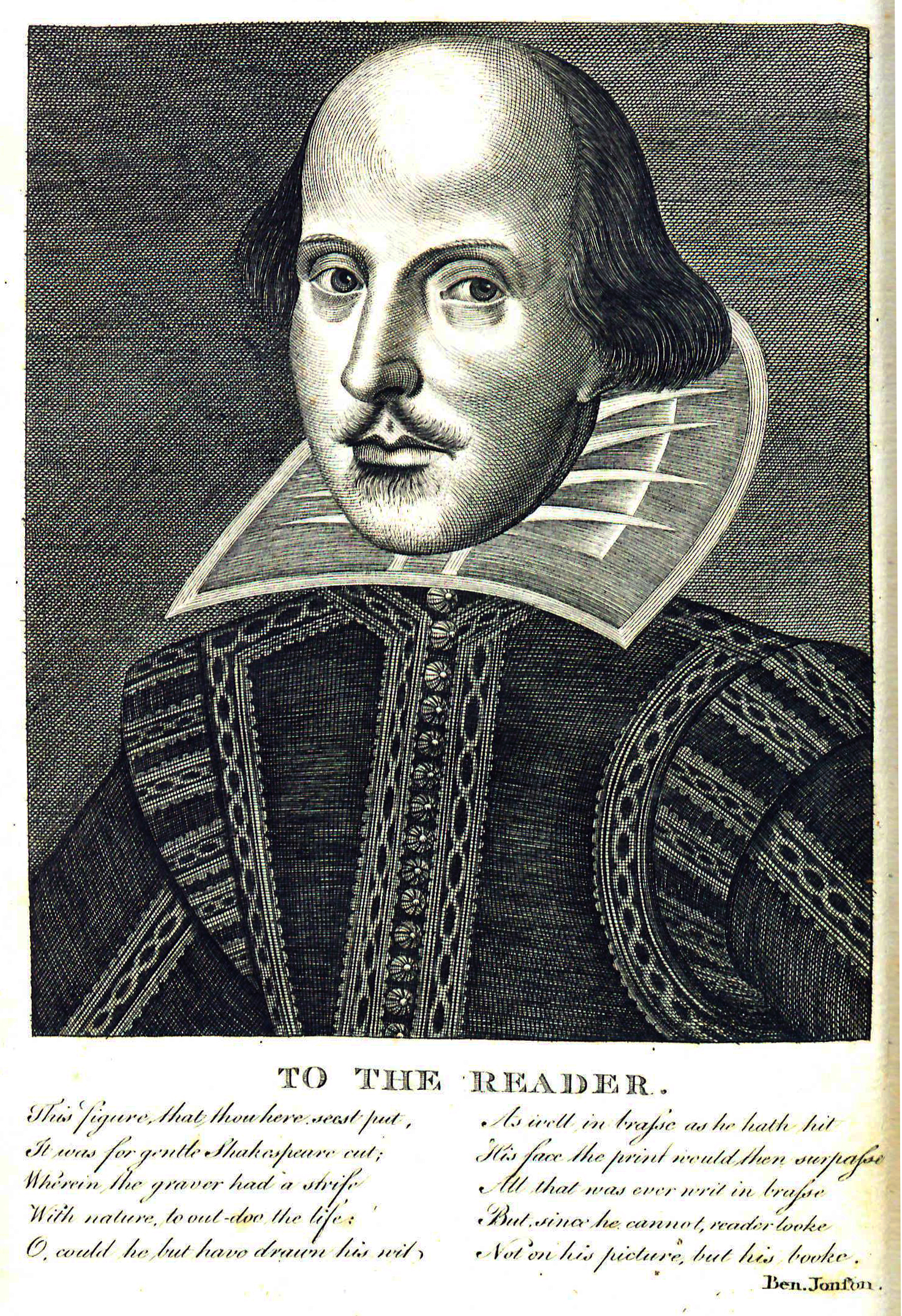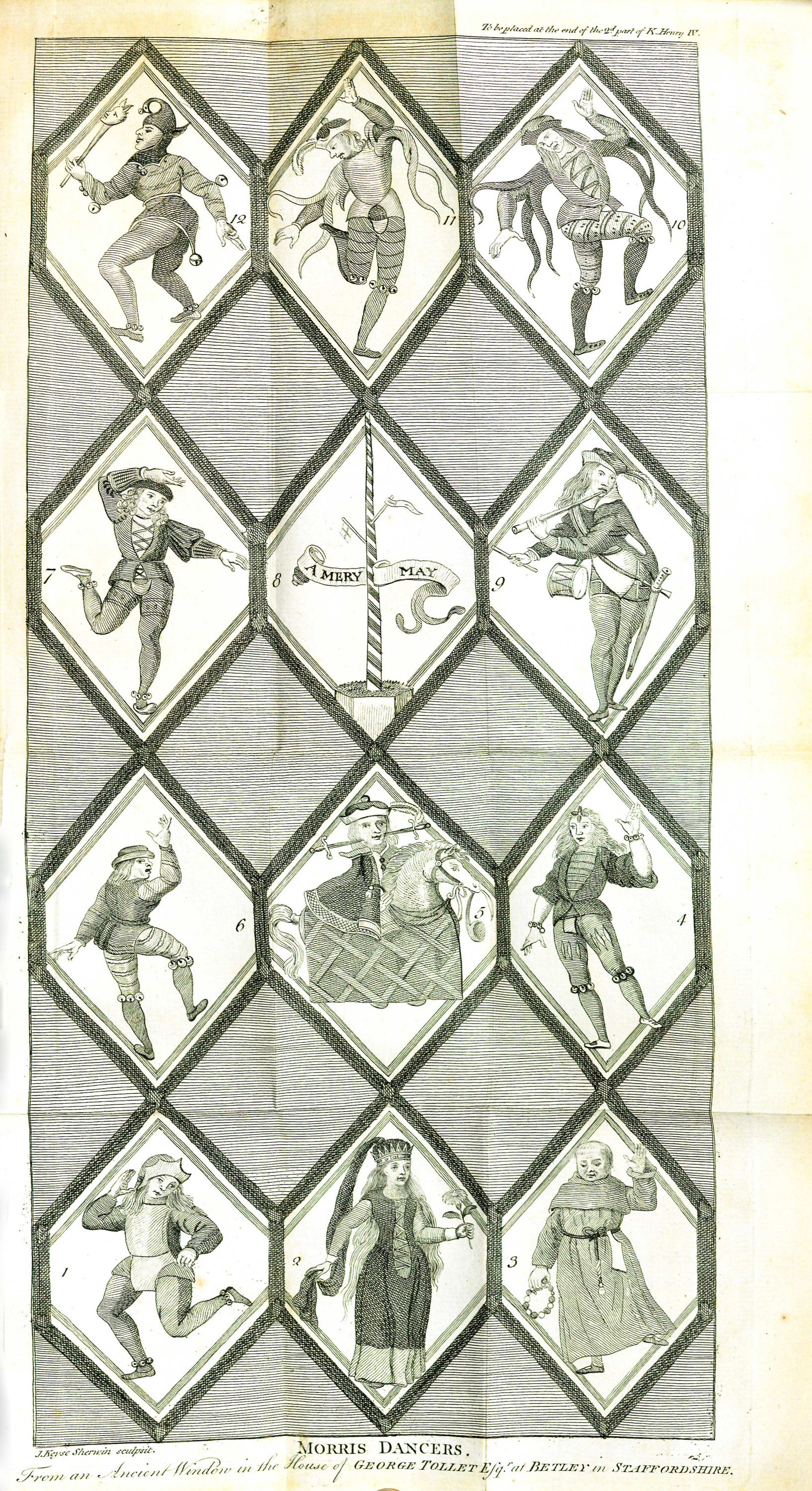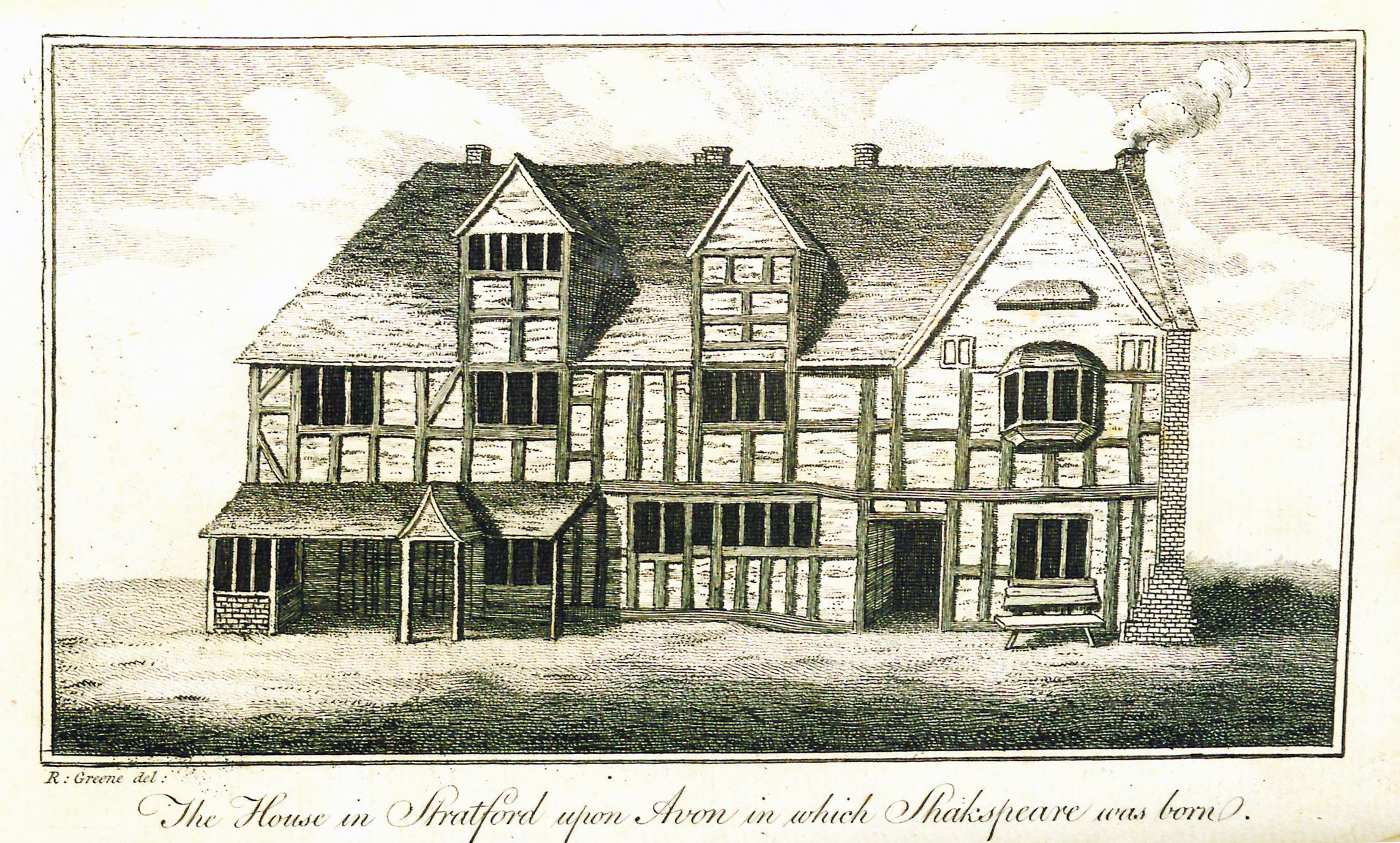Difference between revisions of "Plays of William Shakespeare"
| Line 1: | Line 1: | ||
{{DISPLAYTITLE:''The Plays of William Shakespeare''}} | {{DISPLAYTITLE:''The Plays of William Shakespeare''}} | ||
| − | <big>The Plays of William Shakespeare: in Ten Volumes, with the Corrections and Illustrations of Various Commentators to Which are Added Notes</big> | + | <big>''The Plays of William Shakespeare: in Ten Volumes, with the Corrections and Illustrations of Various Commentators to Which are Added Notes''</big> |
===by William Shakespeare=== | ===by William Shakespeare=== | ||
__NOTOC__ | __NOTOC__ | ||
| Line 9: | Line 9: | ||
|vol=volume three | |vol=volume three | ||
|author=William Shakespeare | |author=William Shakespeare | ||
| + | |editor=Samuel Johnson and George Steevens | ||
|publoc=London | |publoc=London | ||
|publisher=Printed for C. Bathurst et al. | |publisher=Printed for C. Bathurst et al. | ||
|year=1778 | |year=1778 | ||
|lang=English | |lang=English | ||
| − | |set=10 | + | |set=10 and 2 supplement |
|desc=8 vo (23 cm.) | |desc=8 vo (23 cm.) | ||
| − | }}[[File:ShakespearePlays1778v1Frontispiece.jpg|left|thumb|250px|<center>Frontispiece, volume | + | }}[[File:ShakespearePlays1778v1Frontispiece.jpg|left|thumb|250px|<center>Frontispiece, volume one.</center>]][http://en.wikipedia.org/wiki/William_shakespeare William Shakespeare] (1564-1616), a playwright and poet, is widely seen as the foremost writer in the English language.<ref>Peter Holland, [http://www.oxforddnb.com/view/article/25200 “Shakespeare, William (1564–1616)”], ''Oxford Dictionary of National Biography'' (Oxford University Press, 2004), accessed October 7, 2013. Unless otherwise noted, all biographical details are from this source.</ref> Shakespeare was an actor who begun to write plays sometime between 1585 and 1592. He began his career as a playwright with English histories, including ''Henry VI'', comedies, including ''The Taming of the Shrew'', and tragedies, including ''Titus Andronicus''.<ref> S. Schoenbaum, “William Shakespeare, Gentleman,” ''The Wilson Quarterly'', 3, No. 1 (1979), p. 184.</ref> His first published work was the poem ''Venus and Adonis'' (1593).<br/> |
| − | [http://en.wikipedia.org/wiki/William_shakespeare William Shakespeare] (1564-1616) | ||
| − | Unless otherwise noted, all biographical details are from this source.</ref><br/> | ||
<br/> | <br/> | ||
| − | + | Shakespeare's began publishing plays in 1594, during which time he wrote ''Love’s Labour’s Lost'', ''Richard II'', ''Romeo and Juliet'', and ''A Midsummer Night’s Dream''. He continued to write prolifically during the late 1590s and early 1600s. In 1606 Shakespeare wrote ''King Lear'' and ''Macbeth'', which were both influenced by contemporary politics.<br/> | |
| − | Shakespeare | ||
| − | |||
| − | |||
| − | |||
<br/> | <br/> | ||
| − | + | In 1609, Thomas Thorpe famously published Shakespeare’s sonnets, provoking controversy to this day about the rationale behind the order of the sonnets,<ref> J.A. Fort, “The Order and Chronology of Shakespeare’s Sonnets,” ''The Review of English Studies'', 9, No. 33 (Oxford University Press, 1933), p. 22.</ref> and the identity of “W.H.” that Thorpe included in his epigraph.<ref> Donald W. Foster, “Master W.H., R. I. P.,” ''PMLA'', 102, No. 1 (Modern Language Association, Jan. 1979), p. 42.</ref> By 1609, about half of Shakespeare’s plays had been printed. Shakespeare continued to write plays until 1613; he died in 1616.<br/> | |
| − | In 1609, Thomas Thorpe famously published Shakespeare’s sonnets, provoking controversy to this day about the rationale behind the order of the sonnets,<ref> J.A. Fort, “The Order and Chronology of Shakespeare’s Sonnets,” ''The Review of English Studies'', 9, No. 33 (Oxford University Press, 1933), p. 22.</ref> and the identity of “W.H.” that Thorpe included in his epigraph.<ref> Donald W. Foster, “Master W.H., R. I. P.,” ''PMLA'', 102, No. 1 (Modern Language Association, Jan. 1979), p. 42.</ref> By 1609, about half of Shakespeare’s plays had been printed. Shakespeare continued to write plays until 1613 | ||
<br/> | <br/> | ||
| − | + | Shakespeare is known for his exploration of human nature, as Samuel Johnson states in his famous [http://shakespeare.palomar.edu/Editors/JohnsonPreface.htm “Preface to the Works of Shakespeare”], "His persons act and speak by the influence of those general passions and principles by which all minds are agitated, and the whole system of life is continued in motion. . . .Shakespeare has no heroes; his scenes are occupied only by men, who act and speak as the reader things that he himself should have spoken and acted on the same occasion."<ref>Samuel Johnson, “Preface,” ''The Plays of William Shakespeare'', accessed through Shakespeare’s Editors (Palomar 2009), vii and xii.</ref><br /> | |
| − | Shakespeare is known for his exploration of human nature, as Samuel Johnson states in his famous [http://shakespeare.palomar.edu/Editors/JohnsonPreface.htm “Preface to the Works of Shakespeare”] | + | <br /> |
| − | + | The first folio of Shakespeare’s work was published in 1623, and was expanded and revised countless times in the next century. Editions of the collected works of Shakespeare accumulated notes of different editors and biographical details that cumulate with ''The Plays of William Shakespeare: In Ten Volumes''. This folio edition only includes Shakespeare’s plays. | |
| − | + | [[File:ShakespearePlaysOfWilliamShakespeare1778v5Illustration.jpg|left|thumb|250px|<center>Illustration of Morris dancers, volume five.</center>]] | |
| − | |||
| − | |||
| − | |||
| − | The first folio of Shakespeare’s work was published in 1623, and was expanded and revised countless times in the next century. Editions of the collected works of Shakespeare accumulated notes of different editors and biographical details that cumulate with ''The Plays of William Shakespeare: In Ten Volumes''. This folio edition only includes Shakespeare’s plays.< | ||
| − | < | ||
| − | |||
==Evidence for Inclusion in Wythe's Library== | ==Evidence for Inclusion in Wythe's Library== | ||
| + | Listed in the [[Jefferson Inventory]] of [[Wythe's Library]] as "Shakespear by Johnson & Steevens with the Supplement 12.v." This was one of the titles kept by [[Thomas Jefferson]]. Jefferson sold a set of ''The Plays of William Shakespeare'' to the Library of Congress in 1815, but the volumes no longer exist to verify Wythe's prior ownership. Both [http://www.librarything.com/profile/GeorgeWythe George Wythe's Library]<ref>''LibraryThing'', s. v. [http://www.librarything.com/profile/GeorgeWythe "Member: George Wythe"], accessed on February 24, 2014.</ref> on LibraryThing and the [https://digitalarchive.wm.edu/handle/10288/13433 Brown Bibliography]<ref> Bennie Brown, "The Library of George Wythe of Williamsburg and Richmond," (unpublished manuscript, May, 2012) Microsoft Word file. Earlier edition available at: https://digitalarchive.wm.edu/handle/10288/13433</ref> include the second edition (1778-1780) based on Millicent Sowerby's use of that edition in ''Catalogue of the Library of Thomas Jefferson''.<ref>E. Millicent Sowerby, ''Catalogue of the Library of Thomas Jefferson'', 2nd ed. (Charlottesville: University Press of Virginia, 1983), 4:536 [no.4539].</ref> The Wolf Law Library followed Sowerby's recommendation and purchased a copy of the second edition for the [[George Wythe Collection]]. | ||
==Description of the Wolf Law Library's copy== | ==Description of the Wolf Law Library's copy== | ||
| Line 44: | Line 33: | ||
View this book in [https://catalog.swem.wm.edu/law/Record/3466234 William & Mary's online catalog.] | View this book in [https://catalog.swem.wm.edu/law/Record/3466234 William & Mary's online catalog.] | ||
| + | [[File:ShakespearePlays1798Supp1Illustration.jpg|right|thumb|350px|<center>Illustration from ''Supplement to the Plays of William Shakespeare'', volume one.</center>]] | ||
| − | + | ==References== | |
| − | |||
| − | |||
| − | |||
<references/> | <references/> | ||
| + | ==External Links== | ||
| + | Read volume five of this book in [http://books.google.com/books?id=5R8JAAAAQAAJ&pg=PA53&dq=The+Plays+Of+William+Shakespeare+1778&hl=en&sa=X&ei=5FDlUYX9Bbbi4APMqYDwDQ&ved=0CDsQ6AEwAQ#v=onepage&q=The%20Plays%20Of%20William%20Shakespeare%201778&f=false Google Books]. | ||
[[Category:English Literature]] | [[Category:English Literature]] | ||
[[Category:George Wythe Collection at William & Mary's Wolf Law Library]] | [[Category:George Wythe Collection at William & Mary's Wolf Law Library]] | ||
[[Category:Titles in Wythe's Library]] | [[Category:Titles in Wythe's Library]] | ||
Revision as of 15:56, 24 February 2014
The Plays of William Shakespeare: in Ten Volumes, with the Corrections and Illustrations of Various Commentators to Which are Added Notes
by William Shakespeare
| The Plays of William Shakespeare | |
|
Title page from The Plays of William Shakespeare, volume three, George Wythe Collection, Wolf Law Library, College of William & Mary. | |
| Author | William Shakespeare |
| Editor | Samuel Johnson and George Steevens |
| Published | London: Printed for C. Bathurst et al. |
| Date | 1778 |
| Language | English |
| Volumes | 10 and 2 supplement volume set |
| Desc. | 8 vo (23 cm.) |
Shakespeare's began publishing plays in 1594, during which time he wrote Love’s Labour’s Lost, Richard II, Romeo and Juliet, and A Midsummer Night’s Dream. He continued to write prolifically during the late 1590s and early 1600s. In 1606 Shakespeare wrote King Lear and Macbeth, which were both influenced by contemporary politics.
In 1609, Thomas Thorpe famously published Shakespeare’s sonnets, provoking controversy to this day about the rationale behind the order of the sonnets,[3] and the identity of “W.H.” that Thorpe included in his epigraph.[4] By 1609, about half of Shakespeare’s plays had been printed. Shakespeare continued to write plays until 1613; he died in 1616.
Shakespeare is known for his exploration of human nature, as Samuel Johnson states in his famous “Preface to the Works of Shakespeare”, "His persons act and speak by the influence of those general passions and principles by which all minds are agitated, and the whole system of life is continued in motion. . . .Shakespeare has no heroes; his scenes are occupied only by men, who act and speak as the reader things that he himself should have spoken and acted on the same occasion."[5]
The first folio of Shakespeare’s work was published in 1623, and was expanded and revised countless times in the next century. Editions of the collected works of Shakespeare accumulated notes of different editors and biographical details that cumulate with The Plays of William Shakespeare: In Ten Volumes. This folio edition only includes Shakespeare’s plays.
Evidence for Inclusion in Wythe's Library
Listed in the Jefferson Inventory of Wythe's Library as "Shakespear by Johnson & Steevens with the Supplement 12.v." This was one of the titles kept by Thomas Jefferson. Jefferson sold a set of The Plays of William Shakespeare to the Library of Congress in 1815, but the volumes no longer exist to verify Wythe's prior ownership. Both George Wythe's Library[6] on LibraryThing and the Brown Bibliography[7] include the second edition (1778-1780) based on Millicent Sowerby's use of that edition in Catalogue of the Library of Thomas Jefferson.[8] The Wolf Law Library followed Sowerby's recommendation and purchased a copy of the second edition for the George Wythe Collection.
Description of the Wolf Law Library's copy
All volumes uniformly bound in tree calf leather with ornate gilt border to upper and lower boards and gilt turn ins. Three contemporary gilt bordered black leather labels to spines with marbled endpapers. Set includes two volume Supplement edited by Samuel Johnson and George Steevens (London: C. Bathurst [etc.], 1780). Purchased from Weybridge Books.
View this book in William & Mary's online catalog.
References
- ↑ Peter Holland, “Shakespeare, William (1564–1616)”, Oxford Dictionary of National Biography (Oxford University Press, 2004), accessed October 7, 2013. Unless otherwise noted, all biographical details are from this source.
- ↑ S. Schoenbaum, “William Shakespeare, Gentleman,” The Wilson Quarterly, 3, No. 1 (1979), p. 184.
- ↑ J.A. Fort, “The Order and Chronology of Shakespeare’s Sonnets,” The Review of English Studies, 9, No. 33 (Oxford University Press, 1933), p. 22.
- ↑ Donald W. Foster, “Master W.H., R. I. P.,” PMLA, 102, No. 1 (Modern Language Association, Jan. 1979), p. 42.
- ↑ Samuel Johnson, “Preface,” The Plays of William Shakespeare, accessed through Shakespeare’s Editors (Palomar 2009), vii and xii.
- ↑ LibraryThing, s. v. "Member: George Wythe", accessed on February 24, 2014.
- ↑ Bennie Brown, "The Library of George Wythe of Williamsburg and Richmond," (unpublished manuscript, May, 2012) Microsoft Word file. Earlier edition available at: https://digitalarchive.wm.edu/handle/10288/13433
- ↑ E. Millicent Sowerby, Catalogue of the Library of Thomas Jefferson, 2nd ed. (Charlottesville: University Press of Virginia, 1983), 4:536 [no.4539].
External Links
Read volume five of this book in Google Books.



